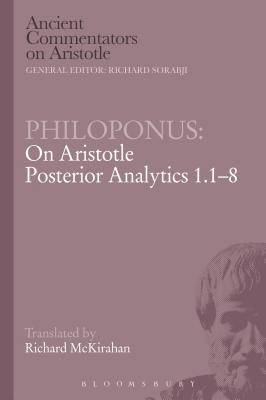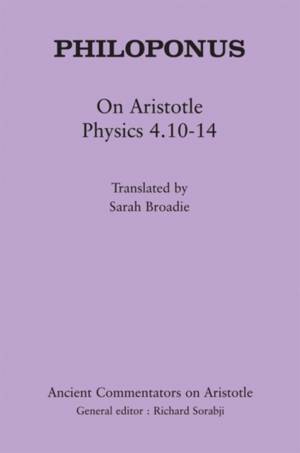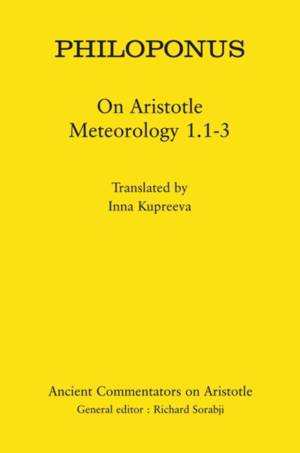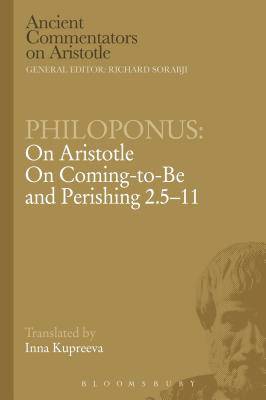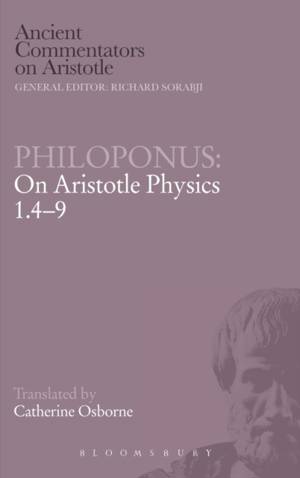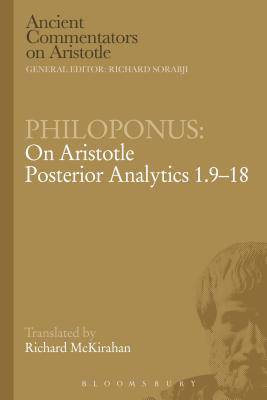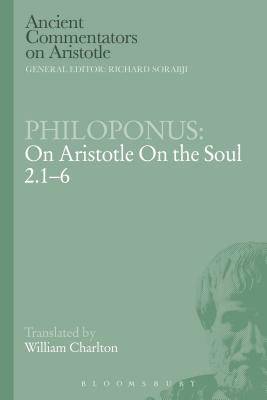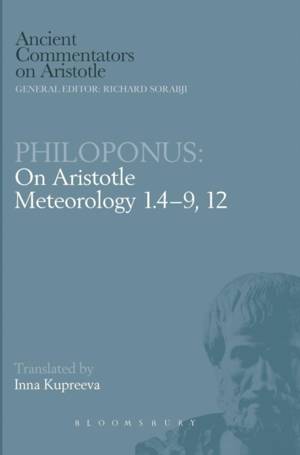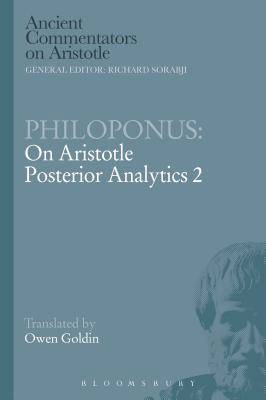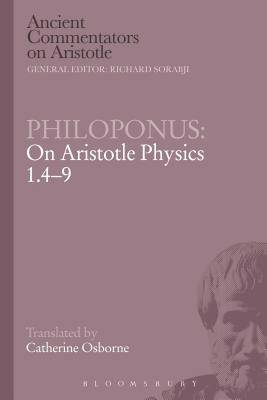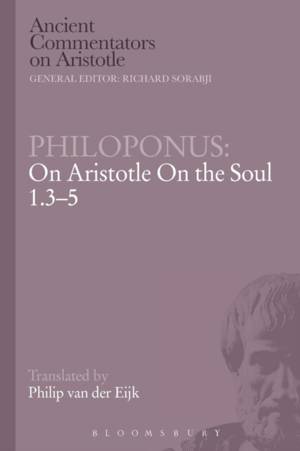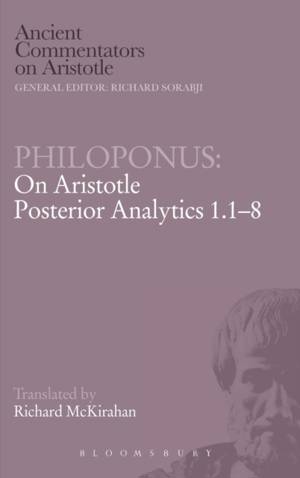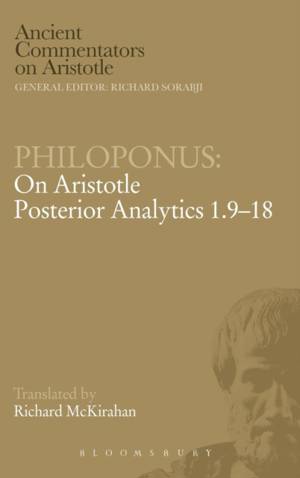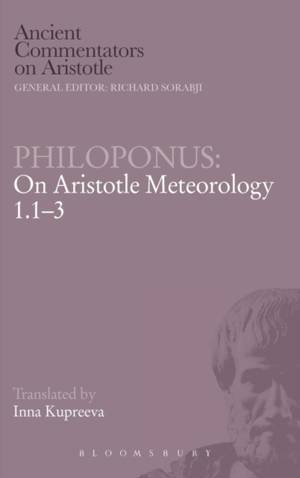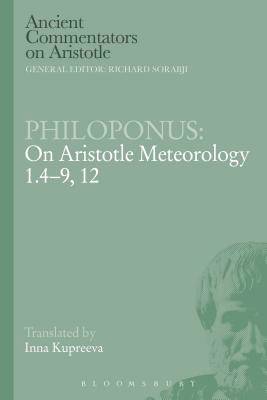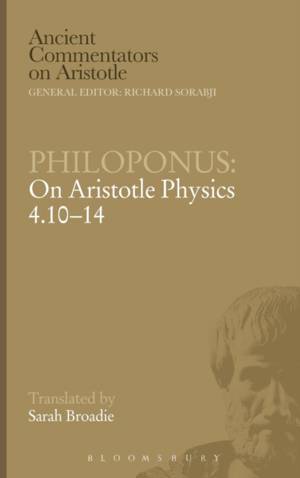
- Retrait gratuit dans votre magasin Club
- 7.000.000 titres dans notre catalogue
- Payer en toute sécurité
- Toujours un magasin près de chez vous
- Retrait gratuit dans votre magasin Club
- 7.000.0000 titres dans notre catalogue
- Payer en toute sécurité
- Toujours un magasin près de chez vous
Livres écrits par Philoponus
Tous les livres de Philoponus
-
Philoponus: On Aristotle Posterior Analytics 1.1-8
Philoponus
- Livre broché | Anglais | Ancient Commentators on Aristotle
- Aristotle's Posterior Analytics elaborates for the first time in the history of Western philosophy the notions of science and the requirements for the... Savoir plus
88,45 €Livraison 2 à 3 semaines88,45 €Livraison 2 à 3 semaines -
Philoponus
Philoponus
- Livre relié | Anglais | Ancient Commentators on Aristotle
- In On The Soul 2.1-6, Aristotle differs from Plato in his account of the soul, by tying it to the body. The soul is the life-manifesting capacities th... Savoir plus
139,95 €Livraison sous 1 à 4 semaines139,95 €Livraison sous 1 à 4 semaines -
Philoponus
Philoponus
- Livre relié | Anglais | Ancient Commentators on Aristotle
- This is one of the most interesting of all post-Aristotelian Greek philosophical texts, written at a crucial moment in the defeat of paganism by Chris... Savoir plus
139,95 €Livraison sous 1 à 4 semaines139,95 €Livraison sous 1 à 4 semaines -
Philoponus: On Aristotle Physics 4.10-14
Philoponus
- Livre broché | Anglais | Ancient Commentators on Aristotle
- Philoponus' commentary on the last part of Aristotle's Physics Book 4 does not offer major alternatives to Aristotle's science, as did his commentary ... Savoir plus
88,45 €Livraison 2 à 3 semaines88,45 €Livraison 2 à 3 semaines -
Philoponus
Philoponus
- Livre relié | Anglais | Ancient Commentators on Aristotle
- In chapters 12-18 of Against Proclus , Philoponus continues to do battle against Proclus' arguments for the beginninglessness and everlastingness of t... Savoir plus
162,45 €Livraison 1 à 2 semaines162,45 €Livraison 1 à 2 semaines -
Philoponus: On Aristotle Meteorology 1.1-3
Philoponus
- Livre broché | Anglais | Ancient Commentators on Aristotle
- Aristotle's Meteorology influenced generations of speculation about the earth sciences, ranging from atmospheric phenomena to earthquakes. The comment... Savoir plus
88,45 €Livraison 2 à 3 semaines88,45 €Livraison 2 à 3 semaines -
Philoponus: On Aristotle Posterior Analytics 2
Philoponus
- Livre broché | Anglais | Ancient Commentators on Aristotle
- The Posterior Analytics contains Aristotle's philosophy of science. In Book 2, Aristotle asks how the scientist discovers what sort of loss of light c... Savoir plus
88,45 €Livraison 2 à 3 semaines88,45 €Livraison 2 à 3 semaines -
Philoponus: On Aristotle on Coming to Be and Perishing 2.5-11
Philoponus
- Livre broché | Anglais | Ancient Commentators on Aristotle
- Until the launch of this series over ten years ago, the 15,000 volumes of the ancient Greek commentators on Aristotle, written mainly between 200 and ... Savoir plus
88,45 €Livraison 2 à 3 semaines88,45 €Livraison 2 à 3 semaines -
Philoponus: On Aristotle Physics 1.4-9
Philoponus
- Livre relié | Anglais | Ancient Commentators on Aristotle
- In the chapters discussed in this section of Philoponus' Physics commentary, Aristotle explores a range of questions about the basic structure of real... Savoir plus
209,95 €Livraison 1 à 2 semaines209,95 €Livraison 1 à 2 semaines -
Philoponus: On Aristotle Posterior Analytics 1.9-18
Philoponus
- Livre broché | Anglais | Ancient Commentators on Aristotle
- In this part of the Posterior Analytics , Aristotle elaborates his assessment of how universal truths of science can be scientifically explained as in... Savoir plus
88,45 €Livraison 2 à 3 semaines88,45 €Livraison 2 à 3 semaines -
Philoponus: On Aristotle on the Soul 2.1-6
Philoponus
- Livre broché | Anglais | Ancient Commentators on Aristotle
- In On The Soul 2.1-6, Aristotle differs from Plato in his account of the soul, by tying it to the body. The soul is the life-manifesting capacities th... Savoir plus
88,45 €Livraison 2 à 3 semaines88,45 €Livraison 2 à 3 semaines -
Philoponus: Against Proclus on the Eternity of the World 9-11
Philoponus
- Livre relié | Anglais | Ancient Commentators on Aristotle
- In one of the most original books of late antiquity, Philoponus argues for the Christian view that matter can be created by God out of nothing. It nee... Savoir plus
373,45 €Livraison 2 à 3 semaines373,45 €Livraison 2 à 3 semaines -
Philoponus
Philoponus
- Livre relié | Anglais | Ancient Commentators on Aristotle
- This is a post-Aristotelian Greek philosophical text, written at a crucial moment in the defeat of paganism by Christianity, AD 529, when the Emperor ... Savoir plus
139,95 €Livraison sous 1 à 4 semaines139,95 €Livraison sous 1 à 4 semaines -
Philoponus: On Aristotle Meteorology 1.4-9, 12
Philoponus
- Livre relié | Anglais | Ancient Commentators on Aristotle
- Of Philoponus' commentary on the Meteorology only that on chapters 1-9 and 12 of the first book has been preserved. It is translated in this series in... Savoir plus
373,45 €Livraison 2 à 3 semaines373,45 €Livraison 2 à 3 semaines -
Philoponus: On Aristotle Posterior Analytics 2
Philoponus
- Livre relié | Anglais | Ancient Commentators on Aristotle
- The Posterior Analytics contains Aristotle's Philosophy of Science. In Book 2, Aristotle asks how the scientist discovers what sort of loss of light c... Savoir plus
373,45 €Livraison 2 à 3 semaines373,45 €Livraison 2 à 3 semaines -
Philoponus: On Aristotle Physics 1.4-9
Philoponus
- Livre broché | Anglais | Ancient Commentators on Aristotle
- Aristotle's Physics 1.4-9 explores a range of questions about the basic structure of reality, the nature of prime matter, the principles of change, th... Savoir plus
88,45 €Livraison 2 à 3 semaines88,45 €Livraison 2 à 3 semaines -
Philoponus: On Aristotle on the Soul 1.3-5
Philoponus
- Livre broché | Anglais | Ancient Commentators on Aristotle
- Until the launch of this series over fifteen years ago, the 15,000 volumes of the ancient Greek commentators on Aristotle, written mainly between 200 ... Savoir plus
88,45 €Livraison 2 à 3 semaines88,45 €Livraison 2 à 3 semaines -
Philoponus: Against Proclus on the Eternity of the World 9-11
Philoponus
- Livre broché | Anglais | Ancient Commentators on Aristotle
- In one of the most original books of late antiquity, Philoponus argues for the Christian view that matter can be created by God out of nothing. It nee... Savoir plus
88,45 €Livraison 2 à 3 semaines88,45 €Livraison 2 à 3 semaines -
Philoponus: On Aristotle Posterior Analytics 1.1-8
Philoponus
- Livre relié | Anglais | Ancient Commentators on Aristotle
- Aristotle's Posterior Analytics elaborates for the first time in the history of Western philosophy the notions of science and the requirements for the... Savoir plus
209,95 €Livraison 1 à 2 semaines209,95 €Livraison 1 à 2 semaines -
Philoponus: On Aristotle Posterior Analytics 1.9-18
Philoponus
- Livre relié | Anglais | Ancient Commentators on Aristotle
- In this part of the Posterior Analytics Aristotle elaborates his assessment of how universal truths of science can be scientifically explained as inev... Savoir plus
373,45 €Livraison 2 à 3 semaines373,45 €Livraison 2 à 3 semaines -
Philoponus: On Aristotle Meteorology 1.1-3
Philoponus
- Livre relié | Anglais | Ancient Commentators on Aristotle
- Aristotle's Meteorology influenced generations of speculation about the earth sciences, ranging from atmospheric phenomena to earthquakes. The comment... Savoir plus
373,45 €Livraison 2 à 3 semaines373,45 €Livraison 2 à 3 semaines -
Philoponus: On Aristotle Meteorology 1.4-9, 12
Philoponus
- Livre broché | Anglais | Ancient Commentators on Aristotle
- Of Philoponus' commentary on the Meteorology only that on chapters 1-9 and 12 of the first book has been preserved. It is translated in this series in... Savoir plus
88,45 €Livraison 2 à 3 semaines88,45 €Livraison 2 à 3 semaines -
Philoponus: Against Proclus on the Eternity of the World 12-18
Philoponus
- Livre broché | Anglais | Ancient Commentators on Aristotle
- In chapters 12-18 of Against Proclus , Philoponus continues to do battle against Proclus' arguments for the beginninglessness and everlastingness of t... Savoir plus
88,45 €Livraison 2 à 3 semaines88,45 €Livraison 2 à 3 semaines -
Philoponus
Philoponus
- Livre relié | Anglais | Ancient Commentators on Aristotle
- Philoponus' commentary on the last part of Aristotle's Physics Book 4 does not offer major alternatives to Aristotle's science, as did his commentary ... Savoir plus
373,45 €Livraison 2 à 3 semaines373,45 €Livraison 2 à 3 semaines





